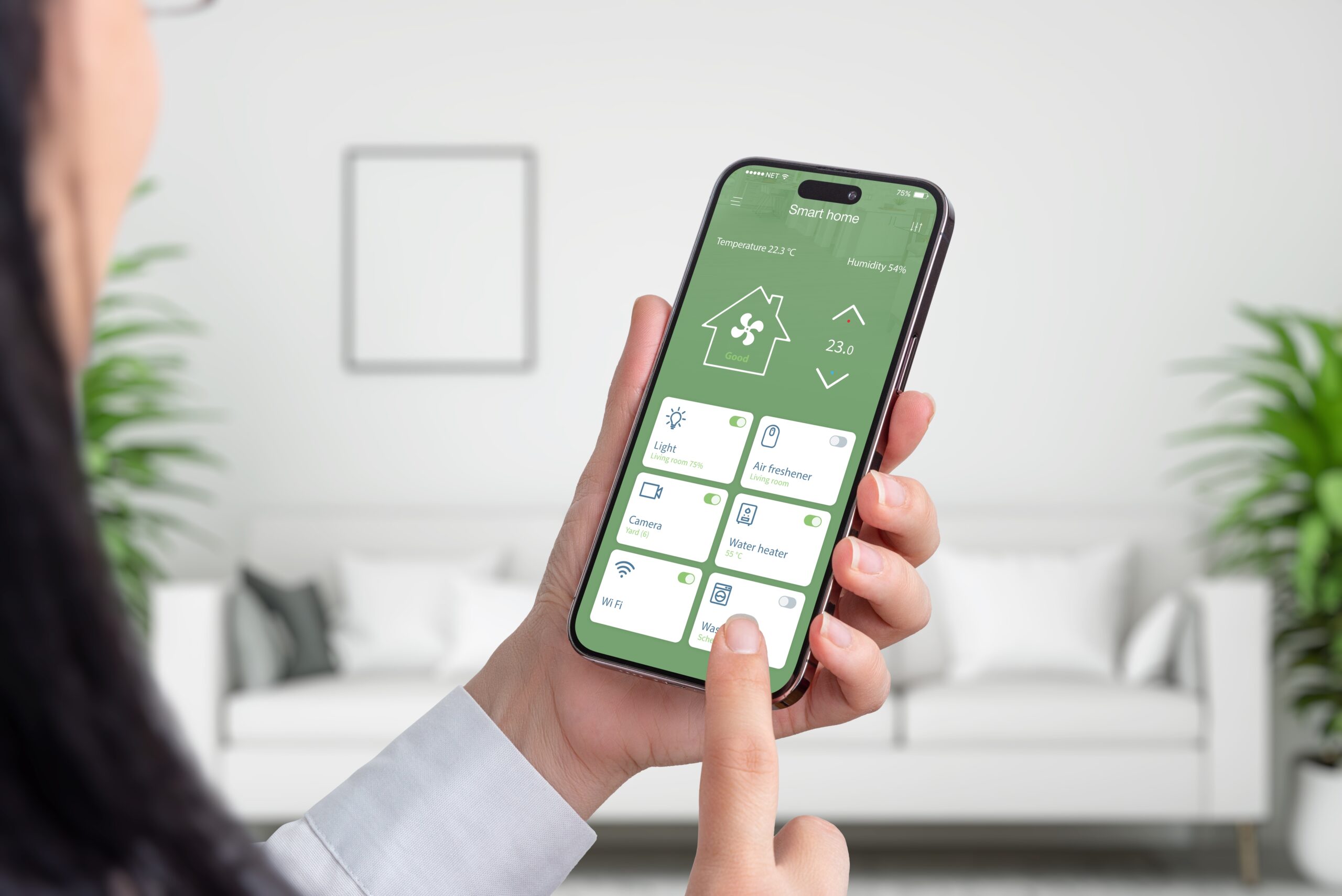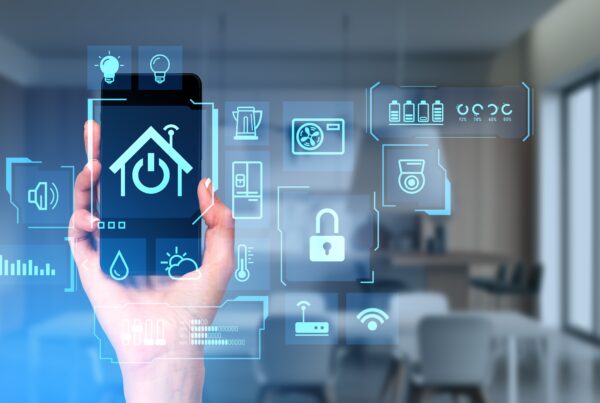In the modern age of technology, the concept of a “smart home” has become increasingly popular. But what exactly is a smart home? Simply put, a smart home is a residence equipped with a network of interconnected devices that can be controlled remotely via a smartphone, tablet, or computer. These devices are designed to automate various household functions, providing convenience, security, and energy efficiency to homeowners. From lighting and heating to security systems and home entertainment, smart homes leverage cutting-edge technology to create a more comfortable and efficient living environment.
At Kent Cables, we recognise the pivotal role connectivity plays in bringing your Smart home vision to life. Our expertise lies in providing the essential wiring and cabling solutions that seamlessly connect your Smart devices, ensuring they function harmoniously. From lighting and climate control to security and entertainment systems, we understand the intricacies of creating a fully integrated Smart home ecosystem. Read on for everything you need to know about Smart homes.
What does a smart home include?
A smart home is comprised of various interconnected devices designed to enhance convenience, security, and energy efficiency. These devices work together to create a seamless living experience, where everyday tasks are automated and controlled with ease. Let’s explore some of the key components that make up a smart home:
Smart Lighting
Smart lighting systems allow homeowners to control the lighting in their homes through mobile apps or voice commands. These systems can adjust brightness, colour, and even schedule lighting patterns to suit different moods and activities. Some smart lighting solutions also come with motion sensors to automatically turn lights on or off, further enhancing energy efficiency.
Smart Thermostats
A smart thermostat provides advanced temperature control, enabling users to adjust heating and cooling settings remotely. These devices learn preferences over time and can automatically create a comfortable indoor climate while reducing energy consumption. By optimising heating and cooling schedules, smart thermostats help lower utility bills and contribute to a more sustainable home.
Smart Security Systems
Smart security systems offer protection through a combination of cameras, motion detectors, door and window sensors, and alarms. These systems can be monitored and controlled remotely, allowing homeowners to keep an eye on their property from anywhere in the world. Advanced features such as facial recognition, two-way audio, and real-time alerts can provide an added layer of security.
Smart Home Entertainment
Smart home entertainment systems integrate various multimedia devices, such as TVs, speakers, and gaming consoles, into a cohesive network. Users can control these devices through a central hub or app, enabling seamless streaming of music, movies, and other content throughout the home. Voice-activated assistants like Amazon Alexa and Google Assistant further enhance convenience.
Smart Appliances
From refrigerators and ovens to washing machines and vacuum cleaners, smart appliances offer enhanced functionality and efficiency. These devices can be controlled remotely, provide usage notifications, and even suggest optimal settings based on user habits. For example, a smart refrigerator can alert homeowners when their shopping is running low!
Smart Home Hubs
A smart home hub serves as the central control point for all connected devices. It allows different smart devices to communicate with each other and provides a unified interface for managing the entire smart home ecosystem. Popular smart home hubs include Amazon Echo, Google Nest Hub, and Apple HomePod.
Smart Locks
Smart locks offer advanced security features, including keyless entry, remote locking and unlocking, and activity logs. Homeowners can grant access to visitors or service providers without needing to be present and can receive notifications when the door is used. Some smart locks also integrate with other security systems for a more comprehensive approach to home safety.
Smart Blinds and Curtains
Smart blinds and curtains can be programmed to open and close at specific times, enhancing privacy and energy efficiency. They can also be controlled remotely, allowing homeowners to adjust window coverings based on weather conditions or personal preferences. Additionally, some models can integrate with other smart home systems, such as lighting and security.
These are just a few of the many components that can be integrated into a smart home. By combining these technologies, homeowners can create a living environment that is not only more convenient and secure but also tailored to their specific needs and preferences.
What are the benefits of smart homes?
- Convenience & Comfort
One of the primary benefits of smart homes is the convenience they offer. With the ability to control various devices remotely, homeowners can manage their household with ease. Imagine adjusting your thermostat while still in bed, or turning on the lights before you walk through the door. Smart homes make everyday tasks more straightforward and efficient.
- Enhanced Security
Smart home security systems provide a higher level of protection compared to traditional security measures. With real-time alerts, remote monitoring, and advanced features like facial recognition, homeowners can ensure their property is always secure. The ability to control locks, cameras, and alarms from anywhere adds an extra layer of security.
- Energy Efficiency
Smart home devices are designed to optimise energy usage, helping homeowners reduce their carbon footprint and save on utility bills. Smart thermostats, lighting, and appliances can adjust their settings based on user habits and external conditions, ensuring energy is used efficiently to contribute to a more sustainable lifestyle.
- Increased Property Value
The integration of smart home technology can significantly increase the value of a property. As more homebuyers seek out properties with advanced features, investing in smart home devices can make a home more attractive on the market. Additionally, the energy savings and convenience offered by smart homes are appealing selling points for prospective buyers.
- Customisation & Personalisation
Smart home systems can be tailored to suit individual preferences and lifestyles. Homeowners can customise settings for lighting, temperature, security, and entertainment to create a personalised living environment. This level of customisation ensures that the home operates in a way that best meets the needs and preferences of its occupants.
- Remote Access & Control
One of the standout features of smart homes is the ability to control devices remotely. Whether you’re at work, on holiday, or simply in another room, you can manage your home’s systems with a few taps on your smartphone. This remote access is particularly beneficial for security and energy management, as it allows for real-time adjustments and monitoring.
- Health & Wellbeing
Smart home devices can also contribute to better health and well-being. Smart purifiers can improve indoor air quality by removing allergens and pollutants. Smart lighting can mimic natural light patterns, promoting better sleep and overall wellness. Additionally, smart home fitness devices can track activity and provide insights to help maintain a healthy lifestyle.
Choosing Smart Home Features for Your Home
Here’s a step-by-step guide to help you navigate the journey of choosing the perfect Smart home features for your home:
- Identify Your Priorities
Begin by identifying what matters most to you. Are you looking to improve security, enhance convenience, save on energy bills, or create an immersive entertainment experience?
- Assess Compatibility
Ensure that the Smart devices you choose are compatible with your existing technology. Compatibility issues can be frustrating, so it’s essential to select products that integrate.
- Set a Budget
Smart home technology can range from budget-friendly to high-end, so establish a budget that aligns with your financial constraints.
- Research and Review
Take the time to research different brands and models of Smart devices. Read reviews, seek recommendations from experts or friends, and explore user feedback.
- Prioritise User-Friendliness
User-friendliness is crucial, especially if you’re new to Smart home technology. Opt for devices with intuitive apps and user interfaces that simplify setup and daily use.
- Plan Your Ecosystem
Consider building a cohesive Smart home ecosystem where devices can work together seamlessly. This approach ensures a more integrated and convenient experience.
- Security and Privacy
Pay attention to the security and privacy features of the devices you choose. Your safety and data protection should always be a priority when integrating technology into your home.
- Seek Expert Advice
If you’re uncertain about your choices, consult with experts in the field or rely on the guidance of professionals who can help you make the best decisions.
- Test and Experiment
As you start incorporating Smart devices, be open to experimentation. Test how they fit into your daily routine and adjust as needed to optimise your Smart home experience.
- Future-Proof Your Choices
Consider the future when choosing Smart home features. Technology is constantly evolving, so select devices that offer room for growth and can be easily updated.
In Conclusion: The Future is Smart
As technology continues to advance, the concept of the smart home will only become more prevalent. The benefits of convenience, security, energy efficiency, and customisation make smart homes an attractive option for modern living. By integrating various smart devices into a cohesive network, homeowners can create a living environment that is not only efficient but also tailored to their unique needs and preferences. Embracing smart home technology is not just about keeping up with the latest trends, it’s about enhancing the quality of life and paving the way for a more connected and sustainable future.
Take the first step towards a smarter future with Kent Cables. Our reliable and efficient connectivity solutions ensure your smart home ecosystem operates seamlessly, enhancing your daily life. Enjoy the comfort, convenience, and savings of a smart home, knowing Kent Cables is your trusted partner on this technological journey. Embrace the future today and let Kent Cables make your home smarter than ever. Your dream of a connected home is just a phone call away.
Smart Homes Frequently Asked Questions
- Are Smart homes expensive to set up?
Setting up a Smart home can be as affordable or as expensive as you choose, depending on the devices and features you want. Get in touch with us for more information.
- Are Smart homes secure from hacking?
Security is a valid concern, but with proper precautions like strong passwords and regular software updates, the risk can be minimised.
- Do I need a reliable internet connection for a Smart home?
Yes, a stable internet connection is essential for Smart home devices to function effectively.
- Can I install Smart features in an existing home?
Yes, most Smart devices are designed to be retrofitted into existing homes.
- Are Smart homes compatible with each other?
Many Smart devices can be integrated into a cohesive ecosystem, but compatibility may vary between brands.
- Can I control my Smart home remotely?
Yes, most Smart home systems can be controlled remotely via Smartphone apps.
- Are Smart homes eco-friendly?
Smart homes can contribute to energy efficiency and reduce your carbon footprint.
- Do Smart homes increase home insurance costs?
Some insurance providers may offer discounts for homes equipped with Smart security features.
- What is the future of Smart homes?
The future of Smart homes holds the promise of even more advanced and interconnected technologies.
- Is it difficult to maintain Smart home devices?
Routine maintenance involves keeping devices updated and ensuring they function correctly.




